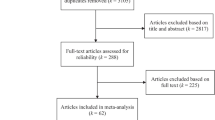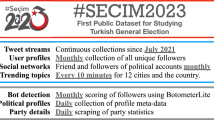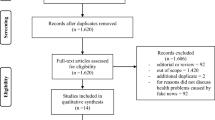Abstract
Sentiments towards racial/ethnic minorities may impact cardiovascular disease (CVD) through direct and indirect pathways. In this study, we assessed the association between Twitter-derived sentiments towards racial/ethnic minorities at state-level and individual-level CVD-related outcomes from the 2017 Behavioral Risk Factor Surveillance System (BRFSS). Outcomes included hypertension, diabetes, obesity, stroke, myocardial infarction (MI), coronary heart disease (CHD), and any CVD from BRFSS 2017 (N = 433,434 to 433,680 across outcomes). A total of 30 million race-related tweets were collected using Twitter Streaming Application Programming Interface (API) from 2015 to 2018. Prevalence of negative and positive sentiment towards racial/ethnic minorities were constructed at the state level and merged with CVD outcomes. Poisson regression was used, and all the models adjusted for individual-level demographics as well as state-level demographics. Individuals living in states with the highest level of negative sentiment towards racial/ethnic minorities had 11% higher prevalence of hypertension (PR 1.11, 95% CI 1.08, 1.14), 15% higher prevalence of diabetes (PR 1.15, 95% CI 1.08, 1.22), 14% higher prevalence of obesity (PR 1.14, 95% CI 1.10, 1.18), 30% higher prevalence of stroke (PR 1.30, 95% CI 1.16, 1.46), 14% higher prevalence of MI (PR 1.14, 95% CI 1.03, 1.25), 9% higher prevalence of CHD (PR 1.09, 95% CI 1.00, 1.19), and 16% higher prevalence of any CVD outcomes (PR 1.16, 95% CI 1.09, 1.24). Conversely, Twitter-derived positive sentiment towards racial/ethnic minorities was associated with a lower prevalence of CVD outcomes. Programs and policies that promote racially inclusive environments may improve population health.


Similar content being viewed by others
References
Lackland DT. Racial differences in hypertension: implications for high blood pressure management. Am J Med Sci. 2014;348(2):135–8. https://doi.org/10.1097/maj.0000000000000308.
Benjamin EJ, Virani SS, Callaway CW, Chamberlain AM, Chang AR, Cheng S, et al. Heart Disease and Stroke Statistics-2018 update: a report from the American Heart Association. Circulation. 2018;137(12):e67–e492. https://doi.org/10.1161/cir.0000000000000558.
Geronimus AT, Hicken M, Keene D, Bound J. “Weathering” and age patterns of allostatic load scores among blacks and whites in the United States. Am J Public Health. 2006;96(5):826–33. https://doi.org/10.2105/ajph.2004.060749.
James SA, Keenan NL, Strogatz DS, Browning SR, Garrett JM. Socioeconomic status, John Henryism, and blood pressure in black adults. The Pitt County study. Am J Epidemiol. 1992;135(1):59–67.
Brewer LC, Cooper LA. Race, discrimination, and cardiovascular disease. Virtual Mentor : VM. 2014;16(6):270–4. https://doi.org/10.1001/virtualmentor.2014.16.06.stas2-1406.
Hill L, Sherwood A, McNeilly M, Anderson NB, Blumenthal JA, Hinderliter AL. Impact of racial discrimination and hostility on adrenergic receptor responsiveness in African American adults. Psychosom Med. 2018;80(2):208–15.
Townsend SSM, Major B, Gangi CE, Mendes WB. From “in the air” to “under the skin”: cortisol responses to social identity threat. Personal Soc Psychol Bull. 2011;37(2):151–64. https://doi.org/10.1177/0146167210392384.
Saban KL, Mathews HL, Bryant FB, Tell D, Joyce C, DeVon HA, et al. Perceived discrimination is associated with the inflammatory response to acute laboratory stress in women at risk for cardiovascular disease. Brain Behav Immun. 2018;73:625–32.
Pascoe EA, Richman LS. Effect of discrimination on food decisions. Self Identity. 2011;10(3):396–406.
Richman LS, Boynton MH, Costanzo P, Banas K. Interactive effects of discrimination and racial identity on alcohol-related thoughts and use. Basic Appl Soc Psychol. 2013;35(4):396–407.
Gibbons FX, Etcheverry PE, Stock ML, Gerrard M, Weng C-Y, Kiviniemi M, et al. Exploring the link between racial discrimination and substance use: what mediates? What buffers? J Pers Soc Psychol. 2010;99(5):785.
Williams DR. Race and health: basic questions, emerging directions. Ann Epidemiol. 1997;7(5):322–33.
Harrell JP, Hall S, Taliaferro J. Physiological responses to racism and discrimination: an assessment of the evidence. Am J Public Health. 2003;93(2):243–8. https://doi.org/10.2105/ajph.93.2.243.
Armstead CA, Lawler KA, Gorden G, Cross J, Gibbons J. Relationship of racial stressors to blood pressure responses and anger expression in black college students. Health Psychol : official journal of the Division of Health Psychology, American Psychological Association. 1989;8(5):541–56.
Szanton SL, Rifkind JM, Mohanty JG, Miller ER 3rd, Thorpe RJ, Nagababu E, et al. Racial discrimination is associated with a measure of red blood cell oxidative stress: a potential pathway for racial health disparities. Int J Behav Med. 2012;19(4):489–95. https://doi.org/10.1007/s12529-011-9188-z.
Hoggard LS, Hill LK, Gray DL, Sellers RM. Capturing the cardiac effects of racial discrimination: do the effects “keep going”? Int J Psychophysiol : official journal of the International Organization of Psychophysiology. 2015;97(2):163–70. https://doi.org/10.1016/j.ijpsycho.2015.04.015.
Brondolo E, Love EE, Pencille M, Schoenthaler A, Ogedegbe G. Racism and hypertension: a review of the empirical evidence and implications for clinical practice. Am J Hypertens. 2011;24(5):518–29. https://doi.org/10.1038/ajh.2011.9.
Dolezsar CM, McGrath JJ, Herzig AJM, Miller SB. Perceived racial discrimination and hypertension: a comprehensive systematic review. Health Psychol : official journal of the Division of Health Psychology, American Psychological Association. 2014;33(1):20–34. https://doi.org/10.1037/a0033718.
Brondolo E, Rieppi R, Kelly KP, Gerin W. Perceived racism and blood pressure: a review of the literature and conceptual and methodological critique. Ann Behav Med : a publication of the Society of Behavioral Medicine. 2003;25(1):55–65. https://doi.org/10.1207/s15324796abm2501_08.
Williams DR, Neighbors H. Racism, discrimination and hypertension: evidence and needed research. Ethn Dis. 2001;11(4):800–16.
Krieger N, Sidney S. Racial discrimination and blood pressure: the CARDIA study of young black and white adults. Am J Public Health. 1996;86(10):1370–8.
Lewis TT, Barnes LL, Bienias JL, Lackland DT, Evans DA. Mendes de Leon CF. perceived discrimination and blood pressure in older African American and white adults. J Gerontol A Biol Sci Med Sci. 2009;64(9):1002–8. https://doi.org/10.1093/gerona/glp062.
Beatty DM, Chang Y, Brown C, Bromberger JT, Matthews KA. Everyday discrimination and metabolic syndrome incidence in a racially/ethnically diverse sample: study of Women's health across the nation. Psychosom Med. 2018;80(1):114–21.
Thomas KS, Nelesen RA, Malcarne VL, Ziegler MG, Dimsdale JE. Ethnicity, perceived discrimination, and vascular reactivity to phenylephrine. Psychosom Med. 2006;68(5):692–7. https://doi.org/10.1097/01.psy.0000238214.80871.e6.
Dunlay SM, Lippmann SJ, Greiner MA, O’brien EC, Chamberlain AM, Mentz RJ et al., editors. Perceived discrimination and cardiovascular outcomes in older African Americans: insights from the Jackson Heart Study. Mayo Clinic Proceedings; 2017: Elsevier.
Okhomina VI, Glover L, Taylor H, Sims M. Dimensions of and responses to perceived discrimination and subclinical disease among African-Americans in the Jackson heart study. J Racial Ethn Health Disparities. 2018;5(5):1084–92.
Chae DH, Lincoln KD, Adler NE, Syme SL. Do experiences of racial discrimination predict cardiovascular disease among African American men? The moderating role of internalized negative racial group attitudes. Social science & medicine (1982). 2010;71(6):1182–8. https://doi.org/10.1016/j.socscimed.2010.05.045.
Everson-Rose SA, Lutsey PL, Roetker NS, Lewis TT, Kershaw KN, Alonso A, et al. Perceived discrimination and incident cardiovascular events: the multi-ethnic study of atherosclerosis. Am J Epidemiol. 2015;182(3):225–34.
Regitz-Zagrosek V, Lehmkuhl E, Weickert MO. Gender differences in the metabolic syndrome and their role for cardiovascular disease. Clin Res Cardiol : official journal of the German Cardiac Society. 2006;95(3):136–47. https://doi.org/10.1007/s00392-006-0351-5.
Moller-Leimkuhler AM. Gender differences in cardiovascular disease and comorbid depression. Dialogues Clin Neurosci. 2007;9(1):71–83.
Beigh SH, Jain S. Prevalence of metabolic syndrome and gender differences. Bioinformation. 2012;8(13):613–6. https://doi.org/10.6026/97320630008613.
Lee S, Ko Y, Kwak C, Yim E-S. Gender differences in metabolic syndrome components among the Korean 66-year-old population with metabolic syndrome. BMC Geriatr. 2016;16:27. https://doi.org/10.1186/s12877-016-0202-9.
Pradhan AD. Sex differences in the metabolic syndrome: implications for cardiovascular health in women. Clin Chem. 2014;60(1):44–52. https://doi.org/10.1373/clinchem.2013.202549.
Stocké V. Determinants and consequences of survey respondents’ social desirability beliefs about racial attitudes. Methodology. 2007;3(3):125–38. https://doi.org/10.1027/1614-2241.3.3.125.
An BP. The role of social desirability bias and racial/ethnic composition on the relation between education and attitude toward immigration restrictionism. Soc Sci J. 2015;52(4):459–67. https://doi.org/10.1016/j.soscij.2014.09.005.
Nuru-Jeter AM, Michaels EK, Thomas MD, Reeves AN, Thorpe RJ Jr, LaVeist TA. Relative roles of race versus socioeconomic position in studies of health inequalities: a matter of interpretation. Annu Rev Public Health. 2018;39:169–88.
Jones CP. Levels of racism: a theoretic framework and a gardener’s tale. Am J Public Health. 2000;90(8):1212–5.
Suler J. The online disinhibition effect. CyberPsychol Behav. 2004;7(3):321–6.
The Racial Slur Database. 2018. http://www.rsdb.org/. Accessed may 21st 2019.
Anderson M, Hitlin P. Social media conversations about race. 2016. https://www.pewinternet.org/2016/08/15/social-media-conversations-about-race/. Accessed May 21st 2019.
Bartlett J, Reffin J, Rumball N, Wiliamson S. Anti-social media. London. 2014. https://www.demos.co.uk/files/DEMOS_Anti-social_Media.pdf. Accessed May 21st 2019.
Lansley G, Longley PA. The geography of Twitter topics in London. Comput Environ Urban Syst. 2016;58:85–96. https://doi.org/10.1016/j.compenvurbsys.2016.04.002.
Diener E, Emmons RA. The independence of positive and negative affect. J Pers Soc Psychol. 1984;47(5):1105–17.
Twitter Sentiment for Researchers. https://sites.google.com/site/twittersentimenthelp/for-researchers. Accessed 30 Nov 2018.
Sanders Analytics - Twitter Sentiment Corpus. http://www.sananalytics.com/lab/twitter-sentiment/. Accessed 30 Nov 2018.
Kaggle UMICH SI650 - Sentiment Classification. 2011. https://www.kaggle.com/c/si650winter11. Accessed Nov. 30 2018.
Behavioral Risk Factor Surveillance System. Centers for Disease Control and Prevention. 2019. https://www.cdc.gov/brfss/index.html. Accessed April 24 2019.
The Behavioral Risk Factor Surveillance System 2017 Summary data quality report. Center for Disease Control and Prevention 2018.
American Community Survey (ACS). 2019. https://www.census.gov/programs-surveys/acs/news/data-releases/2017/release.html. Accessed April 19 2019.
R Core Team, R: a language and environment for statistical computing. In: R Foundation for Statistical Computing, Vienna, Austria. 2013. http://www.R-project.org/. Accessed Nov. 21 2018.
Sims M, Diez-Roux AV, Gebreab SY, Brenner A, Dubbert P, Wyatt S, et al. Perceived discrimination is associated with health behaviours among African-Americans in the Jackson heart study. J Epidemiol Community Health. 2016;70(2):187–94.
Ho M-W. Happiness is a heartbeat away. Science in Society Archive 2007. http://www.i-sis.org.uk/happinessIsAHeartbeatAway.php. Accessed April 23 2019.
Danner DD, Snowdon DA, Friesen WV. Positive emotions in early life and longevity: findings from the nun study. J Pers Soc Psychol. 2001;80(5):804–13.
Chida Y, Steptoe A. Positive psychological well-being and mortality: a quantitative review of prospective observational studies. Psychosom Med. 2008;70(7):741–56. https://doi.org/10.1097/PSY.0b013e31818105ba.
Morris-Prather CE, Harrell JP, Collins R, Leonard KL, Boss M, Lee JW. Gender differences in mood and cardiovascular responses to socially stressful stimuli. Ethn Dis. 1996;6(1–2):123–31.
Kershaw KN, Lewis TT, Roux AVD, Jenny NS, Liu K, Penedo FJ, et al. Self-reported experiences of discrimination and inflammation among men and women: the multi-ethnic study of atherosclerosis. Health Psychol. 2016;35(4):343–50.
Williams DR, Lawrence JA, Davis BA. Racism and health: evidence and needed research. Annu Rev Public Health. 2019;40:105–25. https://doi.org/10.1146/annurev-publhealth-040218-043750.
Ahmed AT, Mohammed SA, Williams DR. Racial discrimination & health: pathways & evidence. Indian J Med Res. 2007;126(4):318–27.
Twitter rules and policies - Hateful conduct policy. https://help.twitter.com/en/rules-and-policies/hateful-conduct-policy. Accessed 5 May 2019
Cesare N, Grant C, Hawkins JB, Brownstein JS, Nsoesie EO. Demographics in social media data for public health research: does it matter? arXiv preprint arXiv:171011048. 2017.
Tweet Location FAQs. http://help.twitter.com/en/safety-and-security/tweet-location-settings. Accessed April 19 2019
Mislove A, Lehmann S, Ahn Y-Y, Onnela J-P, Rosenquist JN, editors. Understanding the demographics of Twitter users. Fifth international AAAI conference on weblogs and social media 2011.
Funding
This study was supported by grants from the National Institutes of Health’s Big Data to Knowledge Initiative (BD2K) (award number: 5K01ES025433) and the National Library of Medicine (award number: R01LM012849 (Dr. Nguyen, Q.C., PI). Research reported in this publication was also supported by the National Institute On Minority Health And Health Disparities of the National Institutes of Health under Award Number R00MD012615 (Dr. Nguyen T, PI).
Collection and storage of the Twitter data used in this publication was supported by the National Drug Early Warning System Coordinating Center housed at the Center for Substance Abuse Research (CESAR) at the University of Maryland, College Park. The content is solely the responsibility of the authors and does not necessarily represent the official views of the CESAR or the University of Maryland.
Author information
Authors and Affiliations
Contributions
Conceptualization: Quynh C. Nguyen; Data Curation: Nikki Adams, Thu T. Nguyen, Dina Huang; Investigation: Nikki Adams, Thu T. Nguyen; Methodology: Quynh C. Nguyen, Dina Huang; Formal analysis: Dina Huang; Writing—original draft preparation: Dina Huang, Yuru Huang; Writing—review and editing: Dina Huang, Yuru Huang, Thu T. Nguyen, Nikki Adams, Quynh C. Nguyen; Visualization: Dina Huang; Funding acquisition: Quynh C. Nguyen.
Corresponding author
Ethics declarations
Ethnic Statement
The study is original research and was not published in any form elsewhere. The study has been approved by University of Maryland Institutional Review Board. Informed consent was exempt because this study utilized publically available Twitter data and BRFSS data for secondary data analyses.
Conflict of Interest
The authors declare that they have no conflict of interest.
Additional information
Publisher’s Note
Springer Nature remains neutral with regard to jurisdictional claims in published maps and institutional affiliations.
Electronic Supplementary Material
ESM 1
(DOCX 253 kb)
Rights and permissions
About this article
Cite this article
Huang, D., Huang, Y., Adams, N. et al. Twitter-Characterized Sentiment Towards Racial/Ethnic Minorities and Cardiovascular Disease (CVD) Outcomes. J. Racial and Ethnic Health Disparities 7, 888–900 (2020). https://doi.org/10.1007/s40615-020-00712-y
Received:
Revised:
Accepted:
Published:
Issue Date:
DOI: https://doi.org/10.1007/s40615-020-00712-y




